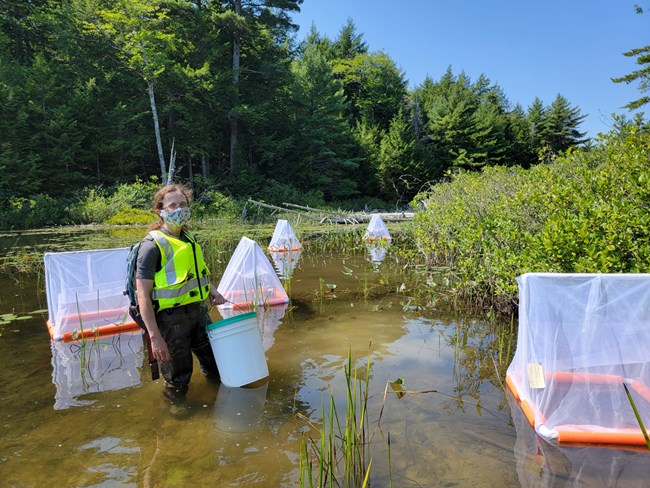Last updated: January 12, 2022
Article
Research Brief: Importance of invasive fish on aquatic food webs

C. Schmitt, Schoodic Institute
Acadia’s lakes and streams are home to 14 native and 9 introduced fish species. Fish in many of Acadia National Park’s lakes and streams have surprisingly high concentrations of toxic mercury.
Building on extensive studies of mercury in Acadia, Christina Murphy, Assistant Leader of the USGS Maine Cooperative Fish and Wildlife Research Unit and 2021 Second Century Stewardship Fellow, is studying how introduced fish affect lake food webs, which can have a ripple effect through the ecosystem. For example, an introduced fish that eats swimming insects can force native fish to switch to eating bugs from the bottom of the lake, leaving fewer bugs available for spiders that hunt this prey along the water’s edge. This can change relationships across habitats, and alter related processes. For example, as the spiders shift their food source, they may consume more or less mercury, which birds take up when they eat the spiders.
Murphy will collect aquatic insect larve and fish from five ponds (Aunt Betty Pond, Eagle Lake, Jordan Pond, Lake Wood, and Long Pond) that have been previously studied as part of the Dragonfly Mercury Project and that have recorded data on stocking and historical fish populations.
Then, using traps, sweep-nets, and mist-nets, Murphy will sample insects again as they hatch and emerge later in the season, and, working with Second Century Stewardship fellow Allyson Jackson, take blood samples from lakeside birds that may be eating the insects.
Samples will be carefully packaged into small tins and sent to Utah State University’s SIRFER laboratory to be analyzed for certain forms of carbon and nitrogen (stable isotopes) that when traced through food chains with computer models can be used to “map” the food web and show how different assemblages of fish species influence food web patterns, including bird diets. Murphy will also be looking at whether the species of fish present in these lakes may also be changing over time.
